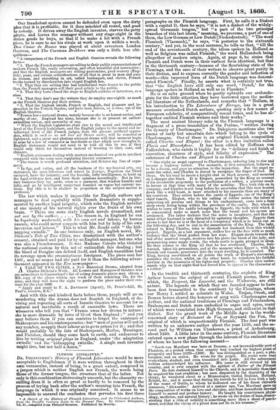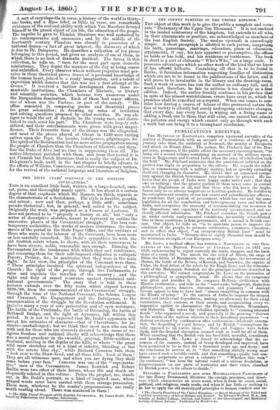FLEMISH LITEPAT1T1LE. *- Da. DBLEPIERIteS History of Flemish Literature would be
more acceptable to Englishmen if it. were written throughout in their own vernacular, instead, of being, to a great extent, composed in a jargon which is neither English nor French, the words being those of the former tongue, the structure that of the latter. Not only is this conabinationdistressingly uncouth, but the obscurity re- sulting from it is often so great as hardly to be removed by the process of trying back after the author's meaning into French, the language in which it was originally conceived. It seems to us impossible to unravel the confusion that pervades his first three
• A Sketch of the History of Flemish Literature, and its Celebrated Authors, from the Twelfth Century down to the Present Time. By Octave Delepierre, LL.D., compiled hom Mullett Sources. Published by Murray.
paragraphs on the Flemish language. First, he calls it a Dialect with a capital D, then he says, " it is not a dialect of the widely- spread Germanic tongue," but "a part of the two principal branches of this last idiom," meaning, we presume, a part of one of them, the Low German or Low Dutch (Niederdeutsoh). " The word Flemisch (Vlaemsch)," he says, " is posterior to the sixteenth century," and yet, in the next sentence, he tells us that, " till the end of the seventeenth century, the idiom spoken in Holland as well as Belgium was called Flemish," the word Hollandsch being altogether of modern origin. Again, at page 6, he states that Flemish and Dutch were in their earliest form identical, but that in the thirteenth century—because of the flourishing state of the Flemings, and the care of their writers to observe great purity in their diction, and to express correctly the gender and inflection of words—this improved form of the Dutch language was denomi- nated Flemish." Finally, he asserts what is certainly not true, that "the English have still only one word, ' Dutch,' for the language spoken in Holland as well as in Menders." He is on safer ground when he gently upbraids our arches:tie- gists for the little attention they have bestowed upon the mediae. val literature of the Netherlands, and remarks that " Hallam, in his introduction to The Literature of Burope, has in a great measure overlooked Dutch authors, quoting only a few names of European celebrity, of comparatively receat times, and he has al- • together omitted Flemish writers and their works." The most ancient literary relic in the Flemish language is a fragment of a prose translation of the Psalms, " written during the dynasty of Charlemagne." Dr. Delepierre mentions also two poems of early but uncertain date which belong to the cycle of Charlemagne. One of these is an original Flemish composition called Charles and Elegast; the other is a free imitation called Flora's and Blanchiloer. It has been edited by Hoffman .von Fallersleben, who extols it highly for its "delicacy and finish of execution, clearness of style, and felicity of expression." The substance of Charles and Blegast is as follows-
" One night an angel appeared to Charlemagne, ordering him to rise and become a highway robber. The monarch, at first astonished, believes it to be a dream, and pays no attention to the injunction. But the angel re- peats the order, and Charles is forced to recognize the finger of God. He obeys. On his road he meets a knight clad in black armour, and mounted on a charger also black. It is Elegast, proscribed by the King on accoimt of his irresistible propensity to the profession of a robber, a pastime much in favour at that time with many of the nobility. They both ride on in company, and Charles is not long before he ascertains that this man hunted down like a wild beast, is more attached to his suzerain than are many of his courtiers. They arrive before the castle of Eggeric, one of the King's chief vassals. Elegast, who to his calling of robber unites the talent of subjecting all persons and things to his enchantment, casts into a deep sleep every living being within the precincts of the castle. But, when he wishes to carry off the saddle belonging to Eggeric, the bells with which it is ornamented make so much noise that the vassal and his spouse are awakened. The latter declares that the noise is imaginary, and that the mind of her husband is only disturbed by agitating thoughts. Eggeric then avows to her that he is at the head of a conspiracy which is to break out on the following day, and to end in the assassination of the King. The lady, related to King Charles, tries to dissuade her husband from this wicked project. Eggeric, as a last argument, strikes her on the face with so much violence that the blood gushes from her nose. Elegast steals towards the bed of the married couple, receives into his glove the blood of the lady, and pronouncing some magic words, the whole castle is again plunged in sleep. Be then relates to the King all that he has overheard. Charles, fore- warned, takes his precautions, and at the moment when Egger' c, with his friends and vassals, penetrates into the royal dwelling, he is arrested. The King, having ascertained on all points the truth of Elegast's statement, punishes the traitor, whilst, on the other hand, he reinstates his faithibi servitor in the possession of his rights and property. Charles then under- stands why on that night God had forced him to appear in the character of a robber."
In the twelfth and thirteenth centuries, the exploits of King Arthur became the subject of several Flemish poems, three of which, the Ferguut, the Lancelot, and the Walewein, are still extant. The legends on which they are founded appear to have been first transmitted to the continent by the Flemings, whom our Henry I. settled as colonists in Wales. Trojan, Greek, and Roman heroes shared the honours of song with Charlemagne and Arthur, and the national traditions of Flemings and Frieslandere, Brabaneons and Dutch were embodied in sagas and epics, many of which were translated into High German, and still exist in that dialect. But the grand work of the Middle Ages is the world,- renowned story of Beinaert de Vos, or Reynard the Fox, the original of which is unquestionably Flemish. The first part was written by an unknown author about the year 1150, and the ea- mind part by William van lltenhoven, a priest of Ardenbourg, about 1260. A little later in the same century, Flemish literature entered upon a new phase through the labours of the eminent man of whom we have the following account— "Jacob van Maerlant was born at Demme, a not inconsiderable port of Flanders, at a period when that country had reached its highest point of prosperity and fame (1235-1300). He was distinguished as a poet, a phi- losopher, and an orator. He wrote for the people. His works were read everywhere, studied, and even translated into Latin. All the subsequent writers acknowledged his influence. His name is still revered by his country, and is ever conFded with the epithet of Dither of the Fkmish Poets. He first destined himself to the Church, and it hiprobably then that he acquired his vast erudition ; but soon disgusted by the depravity of the clergy, he wandered about as a Minnesinger, visited Brabant, Holland, Zeland, &e., and it seems that during his travels he fell in love with a lady of the name of Gotile, to whom he dedicated one of his finest chivalric romances, Alexandre.' Arrived at a mature age, Van Maerlant gave up the composition of works on love and chivalry, and front henceforth devoted himself to sacred and profane history. He taught his countrymen physi- ology, medicine, and natural history ; he wrote on the duties of man,demon- strating that a title of nobility is something more than a sheet of parch- men and that the virtue of a priest does not lie in his tonsure."
A sort of encyclopaedia in verse, a history of the world in thirty-
one books, and a Rytn lad; or Bible in verse, are remarkable evidences of the zeal and ability with which Van Maerlant devoted himself to the grand objectof his life, the education of the people. The impnbie he gave to Flemish literature was well sustained by his contemporaries and successors ; and by the middle of the fourteenth century Flanders was already in possession of a national drama—a fact of great interest, the discovery of which
is due, to Dr. Dalepierre.. He. describes a collection of ten.pieces belonging to this period, and gives an. analysis of one of them, in which there is no lack.of dramatic incident. The farces in this collection, he tells us,. "turn for the most part upon domestic misfortunes. They depict the manners of the day as being. coarse and unbridled. Every, observer who is without prejudice must per- ceive in these theatrical pieces traces of a profound knowledge of the human heart, joined to a ready imagination, and a talent of exposition which denotes that this was not a first attempt at the drama." It received: a further development from those re- markable institutions, the Chambers of Rhetoric, or literary and scientific societies, which became very numerous under the Burgundian domination.. Each of them had many officers, one of whom was the Facteur, or poet. of the society. " His offioe consisted, in composing poems and theatrical pieces for great solemnities ; in drawing up notes of invitation and solving questions proposed by- other societies. He was ob- liged to teach the art of rhetoric to the young men, and distri- buted to each actor his part." The Chambers were largely sub- sidized, and their entertainments were given with great magni- ficence. Their favourite form of the drama was the allegorical, and most of the pieces played at Ghent in 1539 were cutting satires upon the Pope, the monks, indulgences, pilgrimages, &c. The spirit of the Reformation had no more active propagators among the'people of Flanders than the Chambers of Rhetoric, and there- fore the Duke of Alva lost no time in suppressing them all. The native literature perished with them, and from that period it is not Flemish but Dutch literature that is really the subject of Dr. Delepierre's book, until in the last chapter he briefly adverts to the efforts of Willems, Conscience, and other contemporary writers for the revival of the national language and literature of Belgium.



























 Previous page
Previous page